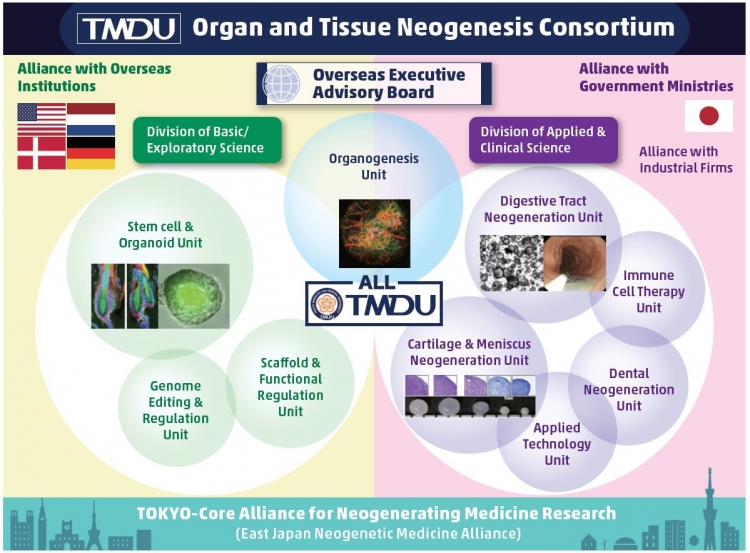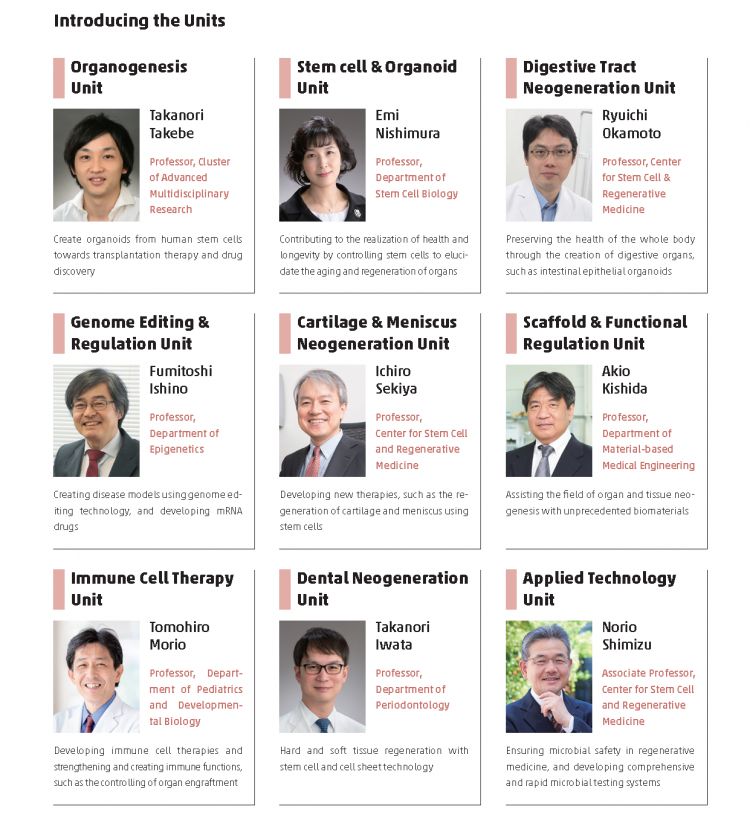TMDU Research NEWS
PDF Download
- Inauguration of the Organ and Tissue Neogenesis Consortium
From early on, the Tokyo Medical and Dental University has been engaged in regenerative medicine research in areas such as immune cells, the oral cavity, the knee joint and the intestinal tract. Furthermore, in order to provide high-quality regenerative medicine to our patients, we have also focused our efforts on the research and development of innovative detection technologies for pathogenic microbes and gene mutations in tumorigenesis.
Based on our extensive experience and achievements in regenerative medicine research, in September 2017, we established the Organ and Tissue Neogenesis Consortium. With the underlying concept of “from Regeneration to Neogenesis,” we are creating a new paradigm of “neogenetic medicine” that has advanced from traditional regenerative medicine. We aim to establish an international research center for “neogenetic medicine” with the cooperation of public institutions, leading researchers from both home and abroad, and private companies. The Consortium is made of nine units that span different departments and laboratories of our university, and has the following three features.
1) Focus on unique target organs
Regenerative medicine research up until now has targeted organs that do not regenerate once they become dysfunctional,such as the heart and nerves. Our university has, however, conducted numerous studies on organs that are inherently highly capable of regeneration, such as the intestines, liver, and hair roots. Through this Consortium, we will focus on research to develop beyond our past achievements with the aim of creating organs for transplantation.
2) Organoid research
Regenerative medicine to date has mostly used disaggregated cells or cell sheets, but we will go further by incorporating organ generation. To be more specific, we are trying to realize regenerative medicine that uses three-dimensional miniorgans called “organoids.”
3) Fostering next generation researchers
We believe this is crucial for the establishment of the new academic field of neogenetic medicine. We seek to provide the next generation researchers with suitable environment and research program. The ultimate goal of this Consortium is to benefit as many patients as possible with the fruits of “neogenetic medicine.” In order to pursue basic research and achieve the practical application of research findings, the cooperation and support of companies and government ministries and agencies is indispensable. With strong dedication, we will do our best to meet your expectations. We sincerely seek your cooperation and support for this cause.
Based on our extensive experience and achievements in regenerative medicine research, in September 2017, we established the Organ and Tissue Neogenesis Consortium. With the underlying concept of “from Regeneration to Neogenesis,” we are creating a new paradigm of “neogenetic medicine” that has advanced from traditional regenerative medicine. We aim to establish an international research center for “neogenetic medicine” with the cooperation of public institutions, leading researchers from both home and abroad, and private companies. The Consortium is made of nine units that span different departments and laboratories of our university, and has the following three features.
1) Focus on unique target organs
Regenerative medicine research up until now has targeted organs that do not regenerate once they become dysfunctional,such as the heart and nerves. Our university has, however, conducted numerous studies on organs that are inherently highly capable of regeneration, such as the intestines, liver, and hair roots. Through this Consortium, we will focus on research to develop beyond our past achievements with the aim of creating organs for transplantation.
2) Organoid research
Regenerative medicine to date has mostly used disaggregated cells or cell sheets, but we will go further by incorporating organ generation. To be more specific, we are trying to realize regenerative medicine that uses three-dimensional miniorgans called “organoids.”
3) Fostering next generation researchers
We believe this is crucial for the establishment of the new academic field of neogenetic medicine. We seek to provide the next generation researchers with suitable environment and research program. The ultimate goal of this Consortium is to benefit as many patients as possible with the fruits of “neogenetic medicine.” In order to pursue basic research and achieve the practical application of research findings, the cooperation and support of companies and government ministries and agencies is indispensable. With strong dedication, we will do our best to meet your expectations. We sincerely seek your cooperation and support for this cause.



